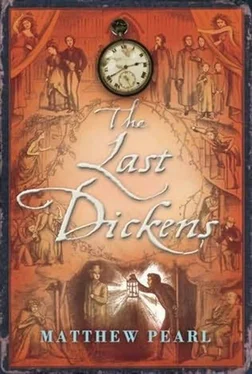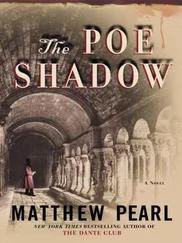Branagan, who no longer looked to be the lad he was in America, but a powerfully built man, retrieved some rope from the curtains and began tying Datchery's hands together
“Mr. Branagan!” Osgood exclaimed. “What is this about?”
“What do you want from me?” Datchery moaned pitiably.
Branagan, eyes dark with anger, stood over Datchery and held him down with the heel of his boot on the soft middle of his neck. “In the name of Charles Dickens, the time has come for answers.”

OSGOOD LOWERED HIMSELF ONTO THE RUG NEXT TO DATCHERY. The publisher could not fathom the sudden upheaval. He turned over in his thoughts what had occurred to try to make sense of it: the near fatal visit to the opium rooms, the revelations of William Trood about his son, Tom Branagan's sudden appearance out of nowhere at the London hotel and senseless attack on his companion.
“Branagan!” Osgood cried. “What have you done? What are you doing here?” Taking Datchery's hand, Osgood attempted to restore his senses. He untied the curtain rope that Tom had used to bind him.
“I wouldn't do that, Mr. Osgood,” Tom said.
“Mr. Branagan, please soak a cloth with cold water from that nightstand. My good Datchery, this is some kind of preposterous misunderstanding. I knew this man briefly as a porter when Mr. Dickens had come to America.”
“It is not I who misunderstand, Mr. Osgood,” said Tom. “I am a porter no more.”
“Then explain yourself at once, if you dare!” Osgood shouted to the handsome younger man. He had tried to restrain his anger but could not once he saw Tom's unrepentant demeanor. “This is what you'd still call acting upon your instinct, I suppose?”
Tom closed the door to the hall. “This man is a fraud and a double dealer. He is not who he says he is.”
“I know he is not Dick Datchery, of course-Datchery is a character in a Dickens novel! I fear you are out of your depth. This man is unwell and under no fault of his own has fallen under a powerful magnetic spell initiated by Mr. Dickens before his death-one that has allowed us unique insights into an important case through his talents as investigator.”
By this time, Datchery had risen to his feet and was steadying himself along the wall until he could be lowered into a chair.
Tom said, “Why not ask him to explain for himself?”
“I don't know what you mean by browbeating me, laddie,” Datchery protested, rubbing his bloody jaw but trying to approximate a smile. “You mistake me.”
“If you will not divulge the truth, so be it. I will. Mr. Osgood, this wretch, disguised in George Washington costume, acted as a speculator and a rioter during the whole of Chief's tour of America-set on sabotage and ruin for the reading tour's financial success.”
The accused's eyes narrowed with anger and he lumbered toward Tom. “I shall not stand here and be insulted!”
Tom threw a long punch into Datchery's stomach. Then he drew a pistol from his pocket and pointed it at the man doubled over in pain.
Osgood stood immovable at the sight of the weapon.
“Datchery, clear out,” Osgood said with an attempt at calm. “Datchery! Go now before you're hurt more seriously,” he repeated. But the man wasn't moving, just looking between Tom and Osgood.
“I will put a ball through you if you lie one more time to him, sir,” Tom said, pistol pointed steady as a rock.
“Datchery, go!” Osgood cried. “Branagan, be still! This man has been a friend to me.” But when Osgood looked over his shoulder at the subject of his words, he saw a strange blank stare that contradicted him.
“Not… Datchery,” said the man, pronouncing the words between a confessional exhale, and his accent softening into a product more of the streets of New York than of the English countryside. He looked at them with a weary eye like the ancient mariner's. “It is Rogers. Jack Rogers. Now you know my name. Pocket your pistol and strike me no more, Mr. Branagan, so that I may have my say.”
JACK ROGERS LOOKED down at his feet for most of his account.
“I did not mean to harm either of you and have grown to respect you, Mr. Osgood, more than I ever expected of a man of bustle and business, for your perseverance, your genuineness. I daresay you've become so tall with accomplishment, you stand in your own light, and don't see how much more of you there is. I hope after hearing my position, you shall understand.”
In his early life, Rogers had been an actor in the second-rate theaters of New York. He came from a modest family of small means, with an unfriendly disposition to his choice of work. His skills on the stage tended mostly toward broadly comedic work and violent adventure. Once, while he rehearsed for a play involving a long sword duel, there was a fall from the stage and the blade of his sword struck the theater manager's son, whom no effort of the doctors over the subsequent hours could save. Rogers was devastated by the horrible accident and banished from the theater. After Rogers had spent irregular bouts of hard employment in the ailing American economy, in the year 1844 the mayor of New York, one James Harper, founder of the Harper & Brothers publishing house, initiated the first police force for that city. These posts were considered undesirable, and it was difficult to fill the rolls. Rogers, having no other work, volunteered.
Harper's Police became a powerful army inside a city that was combustible with political and ethnic rivalries and corruption. The following year the Republican mayor was defeated and the police put in other hands, but the Harpers quietly maintained close ties to the policemen. Soon ex-mayor Harper privately employed Rogers, who had become known for a certain forcefulness of character and alert cleverness and an ability to resolve the enigmatic. When James, still known as the Mayor, or one of the other brothers comprising their publishing enterprise-the Colonel (John), the Captain (Wesley) and the Major, the youngest (Fletcher)-needed assistance, particularly of a secretive nature, Rogers would be discreetly sent for.
One instance of this occurred when Charles Dickens announced in the summer of 1867 that Fields, Osgood & Co. were henceforth to be his exclusive publisher in America. The Harpers envied and feared the income that could be collected by their rivals in Boston. They sent Rogers and one or two other agents to cause disruptions in the ticket sales for the author's American tour, hoping that the newspapers would portray the Boston publisher as incompetent, cheap, and greedy. As part of this scheme of disruption, Rogers, in the guise of a speculator in memorable George Washington wig and hat, spread accusations to the newspapers of Tom Branagan's having sparked the violence at one of those sales. The Harpers, meanwhile, ordered their weekly magazine to print mean-spirited and inflammatory cartoons and columns about Dickens as quickly as they could be invented, just as Fletcher had done in attacks against the wretches, corrupt and immigrant-friendly, who controlled the Tammany political operation.
“You need not glare with moral judgment, gentlemen,” Rogers said, shaking his head in deep sadness. “I know my actions to be deceitful! Many years ago, after my accident on the stage, I suffered constantly from sleeplessness. I would not have survived without laudanum from my doctor. But soon I found I could not go a few days without the drug in my system, I would yield, vowing to myself it was the last. A mere hour without it and my insides would feel torn and shriveled, I would walk about in humiliation and melancholy. Laudanum no longer sufficed, I sought crude opium as if it were the most succulent meal, served by a voluptuous siren in the heart of a violent maelstrom. The opium was my panacea. I took a dose at ten o'clock and another at four and a half o'clock. For hours after taking a fresh dose, I felt invincible and energetic, with an intellectual and physical capacity beyond the mere human. I was Atlas with the world teetering on my shoulders. And so I remained the drug's perpetual slave, and to get more I would have crossed barefoot over hot coals or swam up to my neck in my own blood. Under its influence, my stomach and bowels felt twisted and my head screamed. I took more to try to harden myself, and I entered a dangerous overdose.
Читать дальше













